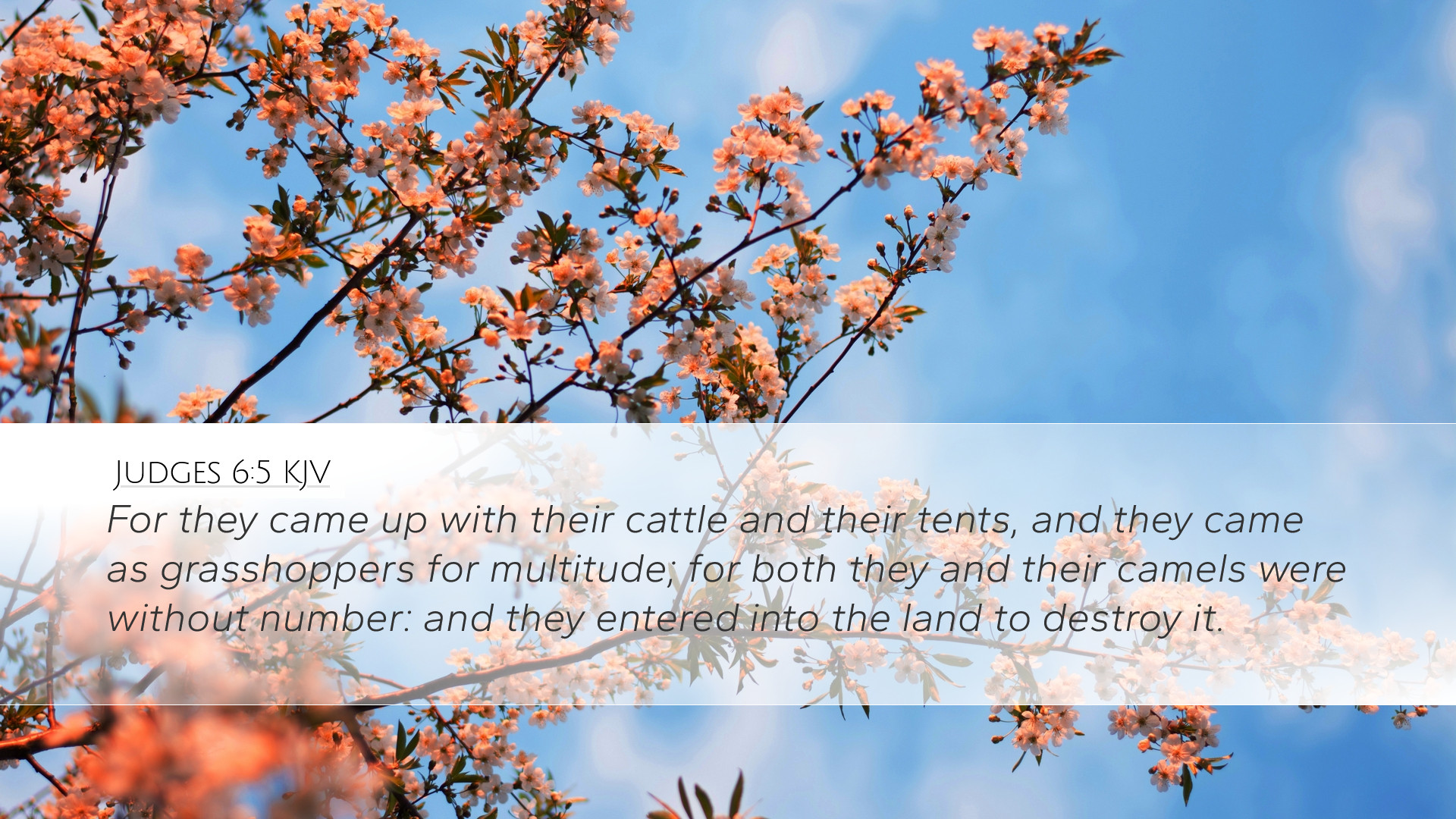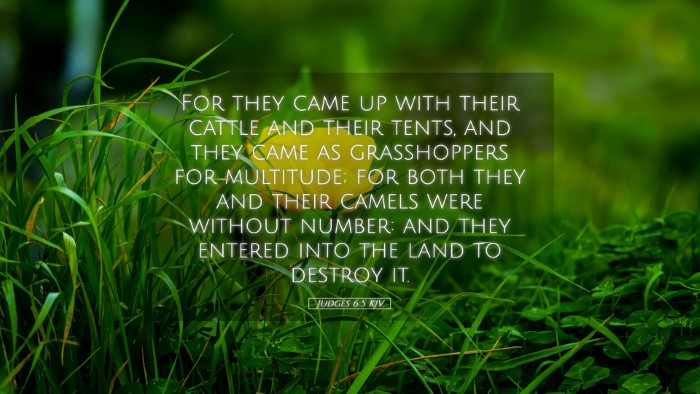Commentary on Judges 6:5
Bible Verse: Judges 6:5 - "For they came up with their cattle and their tents, and they came as grasshoppers for multitude; for both they and their camels were without number: and they invaded the land to destroy it."
Contextual Analysis
The book of Judges illustrates a cyclical pattern of apostasy, oppression, repentance, and deliverance in Israel's history. Judges 6 introduces the narrative of Gideon, one of Israel's judges. This particular verse captures the devastating impact of the Midianite invasion on Israel, describing the overwhelming numbers that threatened the livelihood of the Israelites. The imagery employed conveys not only the physical threat but also the psychological intimidation faced by the people.
General Observations
- Numerical Excess: The use of "grasshoppers for multitude" indicates both the vast number of invaders and conveys a sense of helplessness felt by the Israelites as they confronted such overwhelming odds.
- Destruction of the Land: The invaders’ purpose was not merely to conquer but to annihilate the agricultural foundation of Israel. This signifies a spiritual as well as a physical assault against God’s covenant people.
- Psychological Warfare: The mention of "both they and their camels were without number" illustrates that the Midianites possessed not just numbers, but resources, further enhancing the threat level.
Theological Insights
God’s Sovereignty: Despite the grim circumstances described in this verse, the overarching theme is that God allows difficulties as part of His divine plan to purify and redeem His people. It sets the stage for Gideon’s eventual call and deliverance, emphasizing that God works through unlikely individuals in trying times.
Spiritual Condition of Israel: The invasion signifies divine judgment for Israel's apostasy, demonstrating how their disobedience invited calamity. This serves as a reminder of the covenant relationship, where blessings and cursings are directly linked to obedience and fidelity to God’s will.
Insights from Matthew Henry
Matthew Henry notes that the Midianites appeared as an overwhelming force, encapsulating the terror that the Israelites faced. He writes, “They came up with their cattle and their tents,” highlighting that this invasion was considered an act of incursion into the homes and lives of the Israelites, disrupting their daily existence.
Henry further emphasizes the significance of the imagery of locusts, explaining that just as locusts devour crops, the Midianites aimed to devastate Israel’s land, reflecting God’s hand against a nation that had turned away from Him.
Insights from Albert Barnes
Albert Barnes points out that the Hebrew term used "without number" suggests an immeasurable impact, painting a picture of despair among the Israelites. He elucidates that the Midianites’ incursion reflects God’s chastisement upon the people due to their idolatry and sin, showcasing divine justice in action.
Barnes urges that the enormity of the Midianites’ numbers serves as an illustration of the consequences of Israel's disobedience and a reminder of God’s power to allow their suffering to fulfill a greater purpose.
Insights from Adam Clarke
Adam Clarke interprets the phrase “came as grasshoppers” as a metaphorical representation of the invaders’ multitude and the chaos they brought. He stresses that this imagery is particularly fitting given the agricultural context of Israel, where crop fertility was central to their survival.
Clarke also mentions that during the time of oppression by the Midianites, the Israelites were compelled to become nomadic, hiding their crops to avoid detection. This alteration in lifestyle was a direct consequence of yielding to sin and idolatry.
Contemporary Application
For pastors and theologians, Judges 6:5 serves as a poignant reminder of societal and personal sins and their resultant consequences. It indicates that spiritual apathy or direct disobedience could invite destruction, both physically and spiritually.
This verse also invites an examination of the church in today’s context. Are believers today similarly overwhelmed by external pressures and opposition? In facing overwhelming challenges, we must remember that God’s sovereignty prevails, and He often raises unlikely leaders in desperate times—much like Gideon—to initiate change and deliverance.
Concluding Remark
Judges 6:5 encapsulates a critical moment in Israel’s history, foreshadowing God’s intervention through Gideon. It challenges readers to recognize the spiritual battles they face today and to trust in God's provision and call in less than ideal circumstances.


